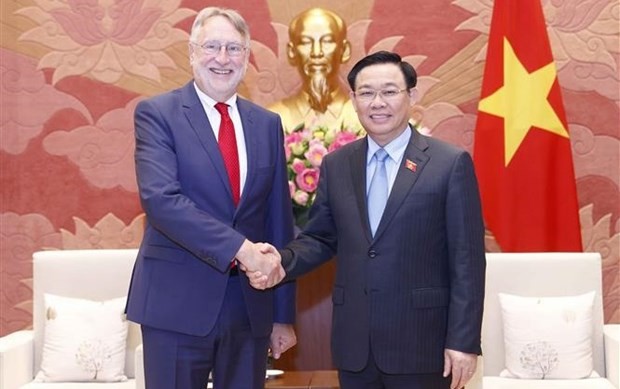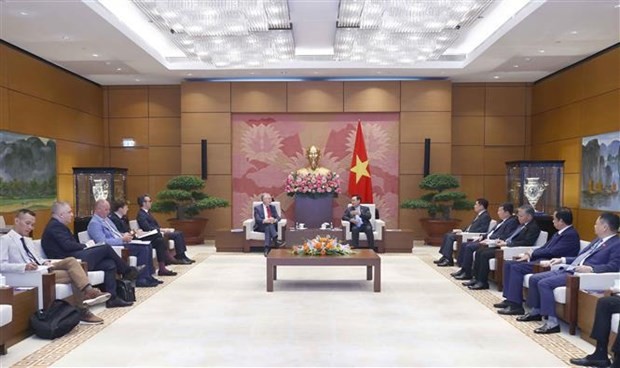 Chairman of the National Assembly Vuong Dinh Hue (R) receives Chairman of the European Parliament’s Committee on International Trade (INTA) Bernd Lange (Photo: VNA)
Chairman of the National Assembly Vuong Dinh Hue (R) receives Chairman of the European Parliament’s Committee on International Trade (INTA) Bernd Lange (Photo: VNA)
Welcoming his guest in Hanoi, the host leader said despite the serious impacts of the Covid-19 pandemic and disrupted regional and global supply chains, economic and trade ties between Vietnam and the EU are growing well thank to the EU - Vietnam Free Trade Agreement (EVFTA).
Meanwhile, though the EU - Vietnam Investment Protection Agreement (EVIPA) has been ratified by just 12 EU members and yet to come into force, businesses and investors from the EU are showing interest in the Vietnamese market.
Hue thanked INTA, the European Parliament, and Lange for their considerable contributions to the EVFTA negotiations, ratification, and implementation.
Meanwhile, the INTA Chairman noted the EVFTA provides a solid foundation for new strides in Vietnam - EU relations, and that statistics recorded in the two years since the agreement’s implementation show its positive economic effects, especially boosting post-pandemic growth.
Regarding the EVIPA, he said the ratification of this deal has been affected by the Covid-19 pandemic. EU member states are now readier to promote the ratification, especially in the current context when they want stability and trustworthy partners.
Chairman Hue affirmed that Vietnam wishes to intensify cooperation with the EU and each of the bloc’s members.
He called on the EU to support Vietnam’s candidacy for a seat on the UN Human Rights Council for 2023 - 2025, continue enhancing ties with ASEAN, step up partnerships in energy and climate change to help the country realize its commitments made at COP26, and cooperate with Vietnam in digital transformation.
He also recommended the two sides continue frequent information exchanges to deal with problems arising in bilateral trade, especially the export of Vietnam’s agro-forestry-fishery products to the EU.
Talking about Vietnam’s efforts to eradicate illegal, unreported and unregulated (IUU) fishing, the NA Chairman expressed his hope that the EU will continue sending delegations to directly assess the country’s implementation of relevant recommendations and soon remove the “yellow card” warning issued by the European Commission.
Meanwhile, though the EU - Vietnam Investment Protection Agreement (EVIPA) has been ratified by just 12 EU members and yet to come into force, businesses and investors from the EU are showing interest in the Vietnamese market.
Hue thanked INTA, the European Parliament, and Lange for their considerable contributions to the EVFTA negotiations, ratification, and implementation.
Meanwhile, the INTA Chairman noted the EVFTA provides a solid foundation for new strides in Vietnam - EU relations, and that statistics recorded in the two years since the agreement’s implementation show its positive economic effects, especially boosting post-pandemic growth.
Regarding the EVIPA, he said the ratification of this deal has been affected by the Covid-19 pandemic. EU member states are now readier to promote the ratification, especially in the current context when they want stability and trustworthy partners.
Chairman Hue affirmed that Vietnam wishes to intensify cooperation with the EU and each of the bloc’s members.
He called on the EU to support Vietnam’s candidacy for a seat on the UN Human Rights Council for 2023 - 2025, continue enhancing ties with ASEAN, step up partnerships in energy and climate change to help the country realize its commitments made at COP26, and cooperate with Vietnam in digital transformation.
He also recommended the two sides continue frequent information exchanges to deal with problems arising in bilateral trade, especially the export of Vietnam’s agro-forestry-fishery products to the EU.
Talking about Vietnam’s efforts to eradicate illegal, unreported and unregulated (IUU) fishing, the NA Chairman expressed his hope that the EU will continue sending delegations to directly assess the country’s implementation of relevant recommendations and soon remove the “yellow card” warning issued by the European Commission.
 An overview of the meeting (Photo: VNA)
An overview of the meeting (Photo: VNA)
Vietnam, including its parliament, is pushing ahead with realizing international commitments in this regard, he stressed, adding this process also needs support from international partners, including the EU. Hue also asked for increased discussion about international issues of common concern, particularly the consolidation of global supply chains and the direct supply chain between Vietnam and the EU to help with post-pandemic economic recovery, ensure food security, and stabilize energy prices. As important partners with mutual trust and respect, they can discuss differences openly via dialogue and cooperation mechanisms, the top legislator noted. Affirming Vietnam is always a trustworthy partner of the EU, Lange said the country holds an important role in the Association of Southeast Asian Nations (ASEAN), and that the EU is ready to advocate Vietnam’s role at other international organizations. In terms of CO2 emission reduction, he said he believes that with the same commitment of achieving net zero emissions by 2050, the two sides will have numerous opportunities to cooperate in this field. He also suggested the two sides increase collaboration in digital transformation both bilaterally and within international cooperation frameworks like the World Trade Organization (WTO). The INTA leader went on to say that the EU recognizes Vietnam’s efforts to carry out recommendations against IUU fishing and hopes that the “yellow card” warning will be lifted soon.
























